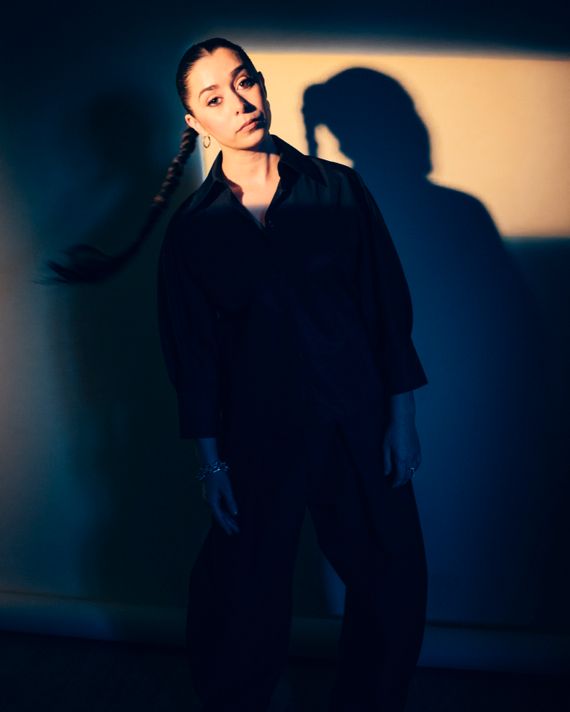
Colin Farrell’s Oz Cobb gets naming rights to the Batman spinoff series The Penguin, but Cristin Milioti’s Sofia Falcone steals the show. As the mob-boss daughter who ascends to the top of her father’s criminal organization after killing most of her family, Milioti injects Sofia’s rise with a feral fervor honed after a decade imprisoned in an asylum: shoving handfuls of pasta into her mouth, puffing on three cigarettes at once, skipping through the family mansion after poisoning her relatives. Farrell is giving the bigger, sometimes outlandish performance, but Milioti renders Sofia as the series’ open wound. The actress has bounced around in various genres over her decadeslong career — from sitcom stints on 30 Rock, How I Met Your Mother, and Mythic Quest to roles in organized-crime narratives like Fargo, The Wolf of Wall Street, and The Sopranos — but few roles have given her the opportunity to tear into a character the way she does with Sofia, whom Milioti plays like a crushed hothouse flower slowly blooming again. In a conversation at Vulture Fest, she discussed her long love for the Batman franchise; finding Sofia through the character’s physical presence, audacious costumes, and the mullet Milioti pushed for; and the pop-diva soundtrack that helped conjure her character.
Watch the encounter in full below, or read on for a transcript of the conversation.
It’s been a week today since the finale aired. What has that week been like for you? Because on my corner of the internet, there are still so many “I would let her step on me” and “Please burn my house down” tweets.
Well, I stay very far away from the internet, but I have been really moved. I have had a lot of incredible interactions out in the world, especially with women stopping me and being like, “Hey, I love this!” It’s so rare that you make something you love and also people respond well to. I’ve been part of a lot of things I’ve loved making and that no one has seen or everyone has actively hated. Well, not actively hated, but been like, “That was crap!” So that’s been really nice. A friend of mine said this thing this weekend that when it’s a mixture of grateful and overwhelmed it’s groverwhelmed, and I’ve felt very groverwhelmed.
What did Sofia offer that you felt like you hadn’t had the opportunity to play yet?
I mean, almost everything. I was so aware of how rare a role like this is. I’ve been so lucky to work on many things with people I’ve grown up admiring and also things I’ve genuinely loved and things I would love to watch even if I wasn’t a part of it in some way. But the fact that she gets to go through so much — I grew up as such a Batman fan, and I’d always wanted to play one of the villains in it. When the opportunity to be involved came to me, I was like, Oh my God, I’ve been waiting for this forever! And even though I was only given that first episode script, there was so much in there.
What was it about Batman that made that world more appealing than Superman or X-Men or Spider-Man?
I love that no one has superpowers; they only have their own pain. And I love that both Batman and his villains are, at the end of the day, sewing their own costumes in their apartments or garages.
DIY!
It’s very DIY! And there’s something about the vigilante of it all that I always found so compelling. We are failed by so many various systems and you get so frustrated sometimes. Who hasn’t wanted to sew a cape and go out? There’s something about it that really moved me. I also loved that it was New York adjacent. I sort of believed that it could happen because there were no superpowers and everybody was sort of fabulous. It was campy sometimes, and it could also be really gritty and dark, but there was also incredible humor in it. I also love how many different iterations there are. I don’t know of anything else where different actors and different directors and different writers really put their stamp on it and it becomes like seeing someone do Othello or King Lear or whatever.
You said, “I used to pretend to be Batman villains in my backyard.” What villains were you pretending to be?
Michelle Pfeiffer’s Catwoman was deeply seminal. I saw that movie when I was 7, which was wildly inappropriate. I was really drawn to it. I remember my dad took me to see it and it really scared me, but that whole scene where she comes home and she’s tearing things up and drinking the milk, I remember feeling like I was levitating watching that. At 7. I would not have been able to explain it, obviously, but I was like I want to be near that. And then Jim Carrey’s the Riddler!
The Penguin was a long production, right? It started in March of ’23, stopped for the strikes, and then you guys came back in November and finished in February. When you think about that time, what feelings come back to you about playing her?
I was having the time of my life. I remember during the strikes being very frightened that we wouldn’t come back because so many things didn’t come back. We were so lucky to come back, and just feeling like, Oh my gosh, I don’t want this to end. It felt like a kid at camp or something — a very dark camp.
The darkest camp anyone has ever been to.
For sure! We got along so well as a cast and crew. You’re shooting nights and it’s cold, you’re outside in New York, and shooting in New York, there’s nothing better. They’re long hours and intense scenes, and we all were so bonded. I was really nervous about ending. I remember a lot of times having to be like, Soak this up, soak this up, really take this in because this is rare.
Do you remember the moment you heard you guys were going to come back?
I do remember. They were like, “We’re back in a week,” and I’d been living like a complete pork chop for six months, absolutely feral. So I was like, Uh-oh! Gotta drink some water! I remember being relieved because we live in a really uncertain time. Obviously, that’s why those strikes needed to happen, but we’re still living in such uncertainty. I was just grateful to be back.
There have been a lot of Batmans, there have been a lot of Gothams, and a lot of them have come from the minds of men: Tim Burton, Bruce Timm, Christopher Nolan, Zack Snyder, David Ayer, Todd Phillips, Matt Reeves. Penguin is Lauren LeFranc, a female creator and showrunner. There are women in this writer’s room. I apologize for getting gender essentialist, but did it feel different to you that this was a project coming from a female creator?
Yeah, it did. Lauren — I don’t think I will ever be able to sing her praises enough. Lauren is the special sauce, you know? I will be indebted to her forever for finding this character deep in the Batman-comic catacombs and resurrecting her. Her brain is so special, and the fact that this is also about this woman expands who connects with it as well. There’s this blood in it and raw, sinewy bone, and it’s also campy and funny and dark. And that’s all from her. A lot of what this character’s going through is coming from being dismissed from a world run by men, so that’s what is so great about seeing her burn it all down.
Lauren mentioned Rosemary Kennedy as an inspiration for Sofia. She said she was deemed the forgotten daughter; in her 20s, her father put her in an institution and she was given a lobotomy. Did you guys talk about Rosemary, or were you talking about other real-life and fictional women who could inspire or shape Sofia?
We talked about Rosemary a bit and then I sort of stayed away because I just wanted to focus on this particular world. But definitely, I watched a lot about state-run institutions where people are locked away for years and forgotten and completely neglected and what that does to you. I watched a bunch of documentaries and read about it, but I didn’t get too attached to any one story. I just consumed a lot of it.
You worked with a movement coach, and you had a playlist. Is there one movement you felt unlocked Sofia for you or was most useful for your performance? And then was there one song or one artist that accomplished the same thing?
Really trying to figure out the way in which she changes physically — I don’t know if there was one move, but trying to figure out how she shifts physically from someone who’s really held and in a Chanel straitjacket to someone who is free and skipping — that was something I really wanted to land. You never know how things are going to be edited or what’s working or what’s you just swinging wildly. There were so many days on this job where I’d call friends and be like, “I think I might be really embarrassing myself.” But it’s so hard to know inside of something. I’d watch everyone else and be like, Well, I don’t feel that way about them. And then my playlist was a lot of Rosalía and a lot of SZA and a lot of Lana Del Rey.
Are those artists you listen to in your normal life? Or were you like, I’m gonna go for bad bitches only, on your playlist?
They’re artists I’m obsessed with in my normal life. In fact, I saw SZA twice last year, once right before we started and once right before we finished. And Rosalía has always been — I think the two of them are peak power. They’re like sea witches or something. I can’t believe what they conjure. And yeah, certainly that did help lock in the energy we were going for.
Lana is so fascinating because her whole thing is mid-century woman betrayed by men, right?
Yes, but there’s also this thing they share in common. You feel that you can really fuck shit up when you listen to them. But there’s also this thing underneath that almost feels like a beating of a drum underground, where you’re like Oh my God, something big is coming. It’s mystical in some way.
You said something about Sofia that I loved, which is that she is someone who has missed pleasure so much. Clothes, food, sex — it’s like someone coming alive again. But it does have to be on her terms. How did you work to convey Sofia’s pleasure?
She’s someone who’s very —
Omnivore?
Omnivore, yeah. And one of the many things I love about her is how unpredictable she can be. Part of the fun of playing her is that she makes decisions in the moment. She can get kind of taken by something, which I think is like a rediscovering of her senses, especially having been denied for so long. With her eating, that was just trying to show, if you were eating in places where it could be taken from you, how you would have to eat almost like an animal but you’re in this beautiful little suit. So that was always very fun to play with.
We have to talk about the mullets. You fought for that hairstyle?
I felt very strongly about her hair and makeup. I was so lucky that our department heads were very, very open to collaboration, and so was Lauren. I’d never been part of a franchise before, so I wasn’t sure how much that would be welcomed. But something Lauren and I talked about was how you could have her getting close to who she eventually becomes using the tools she grew up with, which is hair and nails and wardrobe. That’s how you would express yourself in that sort of Mafia patriarchal … hootie-skootie. I felt really, really strongly about that hair because then it could also be taken back when she had to be around them and couldn’t be herself. There was something that was animal about it.
Then the mullet later on, which I also really fought for, I just thought, That’s how that would evolve. The more she bloomed into who she is meant to be, that would feel good for her to just like, cut at it. It’s also part of the way she presents herself in battle, too. You’re gonna sit up if that person walks into the room wearing what she’s wearing with that fabulous eyeliner. We knew, like, the glass on the gas mask, we kept talking about what was gonna be seen through that and knowing that that gas mask was gonna go with that gown. And the clothes are, like, outrageous. Our wardrobe designer, Helen Huang, is a complete genius. We had hours and hours and hours and hours of fittings, and I usually really don’t like fittings because you’re trying on clothes for hours and getting your picture taken and then they send that picture to a boardroom of people. So every time they’re like “Sell it!” and you’re like “Okay …” and it’s 6 a.m. and you feel crazy.
But this felt very collaborative and very much like we were trying to build her armor as well as free her, too. Those clothes later on are so flowy and free and fabulous. Like, she’s fabulous, even when she’s burning houses down and straight-up killing people.
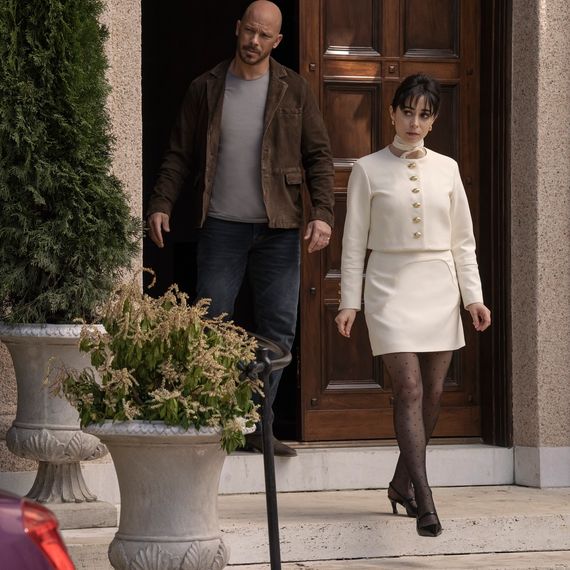
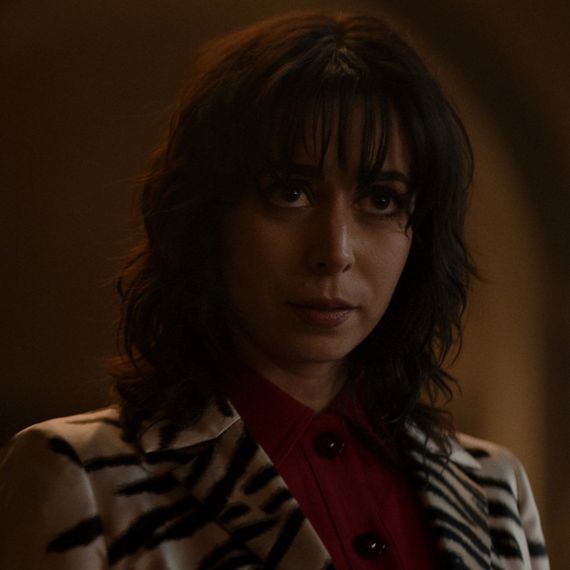
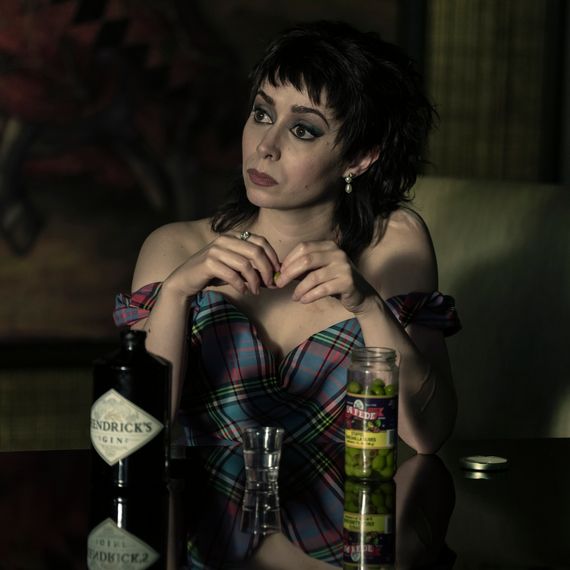
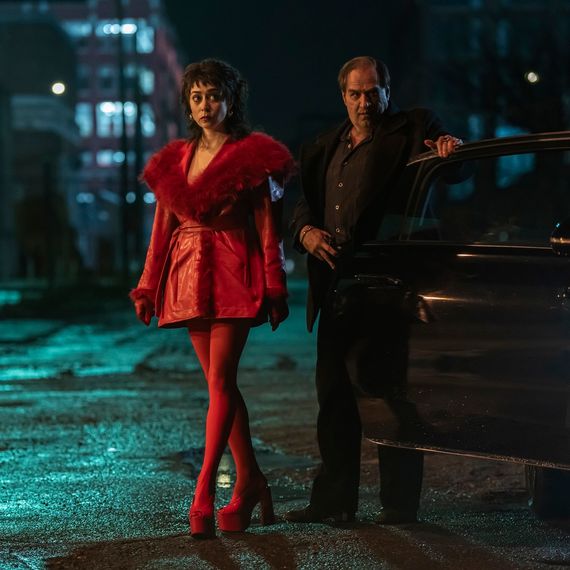
There are definitive phases to this character. When we meet her, she’s a decade into the asylum. We then get the flashback where she is the Chanel-straitjacket daughter. Then, of course, we follow the transformation as she becomes more free, a little more deranged. How did you plan that transformation over time?
At a certain point, it all becomes like a bar fight. Episode four, obviously, that’s one of the most incredible things I’ve ever gotten to be a part of. You’re going through so many time periods, and you only have ten days to shoot that. In one day, you’re going through “Here’s me at 25, here’s me a couple years into Arkham, now it’s ten years later, now I have to go back to 25,” and it was mostly a scramble. Arkham, all the mess-hall stuff, was shot in, like, a day? Two days? A day and a half? You are just shot out of a cannon. That’s the nature of making television, I guess. That was definitely a challenge. It felt like I was a race car that people were running at going, “We only have ten minutes!” Taking my hair off and putting my hair on and then putting the thing on and taking the car off. It was a lot of that. Maybe some of it actually ends up turning into a kinetic energy on-camera.
I love the implication being, like, “For Arkham, they basically put us in Arkham”!
They kind of did! So the woman who directed episodes four and five, Helen Shaver — who is also just one of my favorite people I’ve ever worked with — she was an actor first. That’s really rare that you are working with a director who also understands how utterly embarrassing and humiliating it can be to be in front of a camera and the pressure it comes with and also the glory of it, too. Every day when we had all of our background artists, she would take ten minutes at the top of the day and have us all sit in a circle and be, like, “I want everyone here to think of the character they are and think of why they were put in here and what is their ailment or what is their story.” That never happens. Usually when you’re in scenarios like that, it’s the second AD who’s talking to the background artists and the director talks to the main cast. You’re up against the wall at all times. And she took this ten minutes and she was like, “I’m just gonna roam with you.” It’s like, all of us in here play a very important role in this world, and to walk through that — I still get chills when I think about it. It felt like we were a company. We’re doing brutal stuff — I’m getting slammed on the ground, we’re screaming, all that stuff is so real in there — and that wouldn’t have happened the way it did if it weren’t for her. She did it with everyone in that episode. I can’t sing her praises enough.
Let’s talk about a scene from the finale: It’s Oz and Sofia’s last interaction together. He’s managed to turn the tables on her again, and instead of killing her, hands her over to the cops so they can take her back to Arkham Asylum. What do you remember about filming this?
I mean, this scene is so brutal. He has found a fate for her worse than death. I just was so sad for her, especially when she gets to taste this freedom so brilliantly. But it’s a pretty short amount of time because the show only takes place over the course of four weeks or six weeks, maybe? It’s pretty short that she knows freedom and knows where she’s getting sent back to. And the added layer of their history, of what a horrible callback that is of when he opens the door for her — I just remember being like, This is such a great twist, wow. Lauren did such a great job. But inside, playing her, I was like This sucks! This sucks! It’s just so cruel.
What I love about that profile shot and the pan is the implication that she has accepted death. Do you think she would have preferred that to going back to Arkham?
She would have preferred death, for sure.
Do you feel like there’s any way for her to accrue power in Arkham now that she’s back?
I didn’t think about that because in that moment I was trying to be where she would be. I didn’t think that far ahead.
You have said in a previous interview that you haven’t had any conversations with Matt Reeves and Lauren about a potential season two yet. Has that changed at all?
That hasn’t changed. It’s embarrassing at this point how I would love nothing more. I’ve said it a lot.
We’ve heard that Colin is going to be in The Batman Part II. Is there anything you could tell us about whether Sofia could be in Batman Part II?
That is the same.
I had to try!
No, you had to try.
We all want to know!
For sure. And I would really love it, and I haven’t heard anything.
More From Vulture Festival 2024
- The Show That Won’t Eat Eyeballs
- You’ll Never Believe Who Is Responsbile for Steph Curry’s Shooting
- Katt Williams Tells the Stories Behind Three of His Best Jokes


